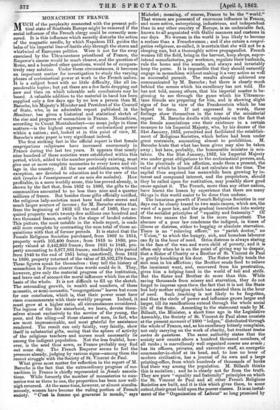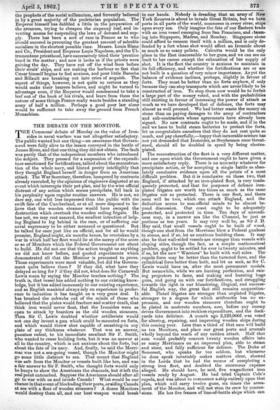. liONACHISM IN FRANCE.
MUCH of the perplexity connected with the present looli- tical state of Southern Europe might be removed if the social influence of the French clergy could be correctly mea- sured. It is this influence which secretly disturbs the action of the magnetic needle, by which Napoleon III. guides the helm of his imperial line-of-battle ship through the storm and whirlwind of European politics. Were it not for the sway exercised by the Ultramontane priesthood of France, the Emperor's course would be much clearer, and the question of Rome, and a hundred other questions, would be of compara- tively easy solution. Under these circumstances, it becomes an important matter for investigation to study the varying phases of ecclesiastical power at work in the French nation. It is a subject beset with no little difficulty, like all im- ponderable topics ; but yet there are a few facts dropping out now and then on which tolerable safe conclusions may be based. A valuable addition to the material in hand has been supplied only a few days ago by no less a person than M. Baroche, his Majesty's Minister and President of the Council of State, who, in an admirable report published in the Moniteur, has given a historical and statistical sketch of the rise and progress of monachism in France. Monachism, according to Count Montalembert—no mean judge in these matters—is the highest expression of ecclesiastical power within a nation ; and, looked at in this point of view, M. Baroche's state paper is very significant indeed. The first striking fact in the official report is that female congregations religieuses have increased enormously in France during the last ten years. It appears that nearly nine hundred of these societies were established within this period, which, added to the number previously existing, must give one or more complete nunneries to every town and vil- lage in the country. All the new establishments, without exception, are devoted to education and to the care of the sick (vouees a 'enseignement et au soin des malades). How profitable, in a mere worldly sense, this has proved already, is shown by the fact that, from 1852 to 1860, the gifts to the communities amounted to no less than nine and a quarter millions of francs. But besides these gifts officially notified, the religious lady-societies must have had other secret and much larger sources of income ; for M. Baroche states that, from the beginning of 1852 till the end of 1660, they ac- quired property worth twenty-five millions one hundred and two thousand francs, mostly in the shape of landed estates. This picture, the most notable in the whole report, is made still more complete by contrasting the sum total of these ac- quisitions with that of former periods. It is stated that the Female Religious Societies purchased, from 1802 to 1814, property worth 105,400 francs ; from ]815 to 1830, pro- perty valued at 5,442,953 francs ; from 1831 to 1845, pro- perty amounting to 5,977,831 francs ; and finally (the period from 1846 to the end of 1851 being unnoticed), from 1852 to 1860, property returned of the value of 25,102,178 francs. These figures speak for themselves : they tell the history of monachism in France .clearer than words could do it. They, however, give only the material progress of the institution, and leave out of account the moral influence which lies at the basis of the whole. It is not difficult to fill up the sketch. The astounding growth, in wealth and numbers, of these monastic, or semi-monastic, "congregations" leaves but room for one conclusion, which is, that their power must have risen commensurate with their worldly progress. Indeed, it must grow at a higher ratio, all circumstances considered. The legions of the fair sisterhood, we learn, devote them- selves almost exclusively to the service of the young, the poor, and the ailing—of those classes of men, in fact, who are most impressionable, and most gfateful for assistance rendered. The result can only faintly, very faintly, show itself in substantial gifts, seeing that the sphere of activity of the religious teachers and nurses must necessarily lie among the indigent population. Not the less fruitful, how- ever, is the seed thus sown, as France probably may find out some day. The French Emperor seems to feel the pressure already, judging by various signs—among them the recent struggle with the Society of St. Vincent de Paul. What gives most matter for reflection in the report of M. Baroche is the fact that the extraordinary progress of mo- nachism in France is chiefly represented in female associa- tions. While formerly the number of monasteries to nun- neries was as three to one, the proportion has been now well- nigh reversed. At the same time, however, or almost simulta- neously, women have become the ruling portion of French society. " C'est la femme qui gouverne le monde," says • Michelet ; meaning, of course, France to be the "world." That *omen are possessed of enormous influence in France, and more active, enterprising, industrious, and independent than in any other country of Europe, is an undeniable fact, known to all acquainted with Gallic manners and customs in our days. No woman in the world is less likely to become a recluse than a Frenchwoman ; and if she enters a congre- gation religieuse, so-called, it is certain that she will not be a sleeping nun, but a thoroughly active propagandist. French women till the field, bring in the harvest, keep iihops, super- intend manufactories, pay workmen, regulate their husbands, rule the home and the senate, and always and invariably keep the purse. It is impossible that they should earnestly engage in monachism without making it a very active as well as successful pursuit. The results already achieved are communicated by M. Baroche ; but there is clearly much behind the scenes which his excellency has not told. He has not told, among others, that his imperial master is be- ginning to see through the game which his Ultramon- tane friends are preparing for him, and is showing slight signs of fear in view of the Frankenstein which he has helped to form. If not expressed in words, these feelings show themselves in the tone of the ministerial report. M. Baroche dwells with emphasis on the fact that the female associations owe their existence in a certain measure to his Imperial Majesty, who, by his decree of the 31st January, 1852, permitted and facilitated the establish- ment of Religious Societies, which before had been under great restraints, amounting almost to prohibition. M. Baroche hints that what has been given may also be taken away ; but here, probably, the honourable minister is mis- taken. On the 31st January, 1852, his Imperial Majesty was under great obligations to the ecclesiastical powers, and, in the plenitude of his affection, made them a present, the value of which he himself did not calculate at the time. The capital thus acquired has meanwhile been growing by in- terest and compound interest, and the pioprietors, should they be called upon for restitution, may possibly show good cause against it. The French, more than any other nation, have learnt the lesson by experience that there are many things in this world easier to be done than undone.
The luxurious growth of French Religious Societies in our days can be clearly traced to two main causes, which are, the want of a poor law, and the gradual inoculation into society of the socialist principles of "equality and fraternity." Of these two causes the first is the more important. The absence of a poor law condemns the indigent, in times of illness or distress, either to begging or absolute starvation. There is no "relieving officer," no "parish doctor," no "Union," to which the hungry, sick, and homeless labourer can fly in the hour of need. Grim distress is always staring in the face of the wan and worn child of poverty, and it is often only when he is on the point of giving way to despair, that a Sister of Charity or a Brother of St. Vincent de Paul is gently knocking at his door. The Sister kindly tends the sick man in his affliction ; the Brother sends food to relieve the imminent want, and, recovered from his prostration, gives him a helping hand in the world of toil and strife. But the Sister and Brother do more than this. While saving thousands from misery and starvation, they do not forget to impress upon them the fact that it is not the State but holy mother religion which has assisted them in the hour of need. Such ;teaching is not likely to be forgotten, and thus the circle of power and influence grows larger and larger, till its ramifications extend through the whole social life of the State. According to the statement made by M. Billault, the Minister, a short time ago in the Legislative Assembly, the Society of St. Vincent de Paul alone consists at the present moment of 1600 "lodges," distributed through the whole of France, and, as his excellency bitterly complains, not only carrying on the work of charity, but traitant touts, sortes de questions. The same, authority states that the society now counts above a hundred thousand members, of all ranks; is marvelously well organized comme une armee ; has its officers, privates, and executive staff, an energetic commander-in-chief at its head, and, to lose no lever of modern civilization, has a journal of its own and a large printing-office, from which hundreds of thousands of books find their way among the population. M. Billault thinks this is socialism ; and he is clearly not far from the truth. They are pure "equality and fraternity" principles on which the St. Vincent de Paul and all other French Religious Societies are built, and it is this which gives them, to some extent,their great hold upon the poorer classes. It is an. instal- ment of the "Organization of Labour" so long promised by the prophets of the social millennium, and fervently believed in by a great majority of the proletarian population. The Emperor himself has dabbled a little in the preparation of the arcanum, trying to cheapen the sixpenny loaf, and in- venting means for suspending the laws of demand and sup- ply. There has been a sort of race in France as to who should succeed in procuring the greatest amount of saleable socialism in the shortest possible time. Messrs. Louis Blanc and Co., President and Emperor Louis Napoleon, and thelJ1- tramontane priesthood, have successively tried their 'prentice hand in the matter ; and now it looks as if the priests were gaining the day. They have cut off the wind from before their rivals' ships, and are making the harbour so fast that Cmsar himself begins to feel anxious, and poor little Baroche and Billault are breaking out into cries of anguish. The aspect of things, however, is not quite so serious as they would make their bearers believe, and might be turned to advantage even, if the Emperor would condescend to take a leaf out of the book of his rivals, and learn from them the nature of some things France really wants besides a standing army of half a million. Perhaps a good poor law alone would be sufficient to take away the ground from French Monachism.































 Previous page
Previous page